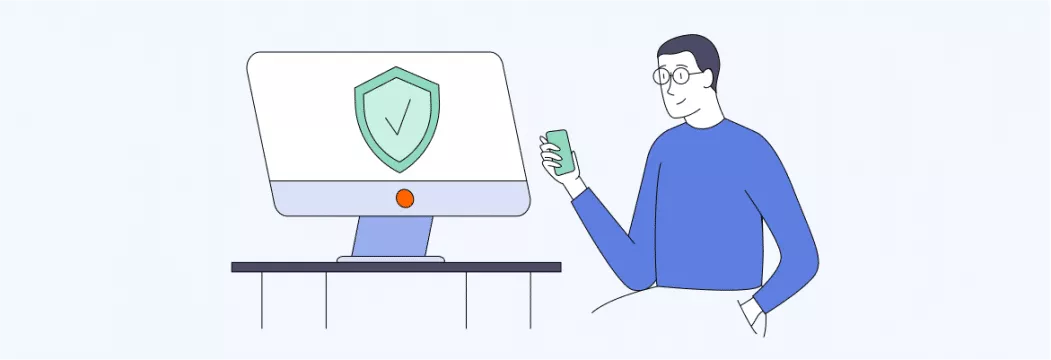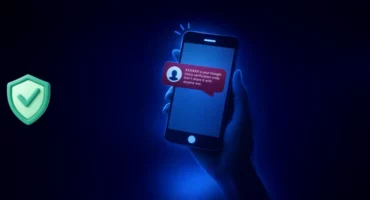VPN Benefits: Exploring the Pros and Cons
Did you know that a VPN dates way back to the 90s? It was a solution of a clever Microsoft employee to securely connect remote computers. Fast forward to today, and VPNs became a popular tool for protecting our online privacy and freely accessing content. But as with anything, there are VPN pros and cons to consider, impacting the overall benefits of VPN usage. So, let’s learn all about them!

What is a VPN? (quick overview)
A virtual private network is like a secret pathway that encrypts and reroutes your online activity through a server in another location. Imagine the Internet is a highway. The highway allows information to travel among servers and devices all over the world. Now, think of VPN as a tunnel. Instead of using the open roads to send and receive items, your data travels in a private tunnel and stays private.
But a VPN is a lot more than data privacy. And surely, there are some drawbacks to it, too. Let’s learn more.
VPN pros and cons
What are the VPN advantages and disadvantages? Here’s a quick overview:
| VPN Pros | VPN Cons |
|---|---|
| Data security | Slower Internet speeds |
| Improved online privacy | Free VPNs are dangerous |
| Access to content worldwide | VPNs are illegal in some coutries |
| Security on public Wi-Fi | Incompatability with certain devices |
| Protection in hostile environments | Good VPNs cost money |
| Improved gaming | Connection can be unstable (mention kill switch here) |
VPN benefits

So, what happens when you click that “Connect” button in the VPN app? Your VPN:
- Connects you to a remote VPN server in the location of your choice
- Gives you a new IP address
- Reroutes all your Internet activity through that server
- Encrypts all the data you send and receive
As a result, you get a new virtual location and have all of your data protected. But what advantages of using a VPN come with this, precisely? These are some of the main benefits of using a VPN.
Security for your data
When we use the Internet, our data goes on a wild journey through different servers. Our private messages, passwords, and financial info are all up for grabs if we don’t encrypt it. Scary, right? Not if you use a VPN.
A VPN encrypts all your traffic, making it secure from snoopers. And if you go for a provider like VeePN, you’ll get super strong AES-256 encryption and modern VPN protocols that protect your data without compromising speed. Windows Report — a highly trusted web resource for all tech-related news and tips — has recently selected VeePN as one of the best VPN services. So rest assured your data will be safe and sound.
Other VeePN features has got you covered, as well. One example is NetGuard — it helps you avoid malware, block annoying ads, and keep your browsing smooth and safe.
Enhanced online privacy
Online privacy is an oxymoron. And we’re going to be brutally honest with you — a VPN can’t guarantee total anynomity online. But it can help step up your privacy game by preventing online tracking. There are a lot of snoops out there who can follow you around different sites, from Internet service providers (ISP) to ad agencies.
Your ISP can see everything you’re doing online. That’s because all your data goes through their servers and hardware. What’s “better” is that ISPs can sell your data to third parties, like marketers or government institutions. But when you use a VPN, online tracking becomes much harder thanks to data encryption and your new IP address.
Access to geo-restricted content
Depending on where you are, you might not be able to access certain information or websites. Sometimes even search engine results can change depending on your location. And in some cases, content gets censored or blocked for political or commercial reasons — thanks a lot, regional blocks.
But here’s where VPN comes in handy. A new IP address allows you to bypass all those regional limits and access blocked websites and apps. For example, you want to stream Netflix when traveling abroad, but Netflix libraries differ by country and you want to have your library. Or access a news platform blocked in a country with low Internet freedom.
Just remember, though — using a VPN doesn’t justify illegal behavior. If you break the terms of service of any service while using a VPN, you’ll still get in trouble. So let’s not be naughty.
Disclaimer: VeePN is the VPN service not intended to be used for bypassing copyright regulations or other illegal behavior. For more details, please read the VeePN Terms of Service.
Secure public Wi-Fi connections
Open Wi-FI hotspots are swarming with hackers — there your data is out in the open and an easy target. Using a VPN comes in handy when you’re performing financial transactions using public Wi-Fi (you want your banking info safe, right?) or working at a cafe, airport, and other public spaces.
Protection in hostile environments
If you ever travel to a country with a not-so-great track record of Internet freedom, a VPN is going to be your best friend. Because in those places, your online activity can have some serious consequences.
And VeePN’s Kill Switch will keep you safe even if your VPN connection suddenly drops. This bad boy automatically cuts off your online connection so you’re never left browsing unprotected. Safety first, people!
Improved online gaming experience
Some online games don’t do a good job of hiding your IP address. And that can be a real problem because it leaves you open to a distributed denial-of-service (DDoS) attacks. But when you use a VPN, it keeps your IP address hidden, closes those open ports (which are basically an invitation for hackers), and saves you from getting hit by a DDoS attack while you’re playing. This is a real VPN benefit.
So get a reliable VPN for gaming and play on without any worries!
Additional VPN benefits
What’s the best thing about a VPN is that it’s a versatile tool. It can also prevent ISP throttling, help you save money, and give your protection for all your devices.
Disadvantages of a VPN
All of the above makes it seem like there might be a catch, huh? And that’s because when it comes to increased security, there is a price to pay — both in the literal sense and figuratively speaking.
So here’re the main disadvantages of using a VPN.
Slower Internet speed
Does VPN slow down your Internet speed? Yes. With a VPN, your data has to go through extra encryption and routing processes. This can slow down your connection. But sluggish speeds won’t be a pain in the neck if you opt for a top VPN provider. Besides, a VPN can even increase your speed if your ISP has been slowing down your connection.
VeePN uses fast protocols, like WireGuard®, and powerful infrastructure. This makes the speed drop barely noticeable and allows you perform traffic-heavy activities (streaming, gaming) with no serious lags.
And Split Tunneling feature makes it even more easy — this gem lets you choose which part of the data traffic gets encrypted. For example, you can choose a streaming service to bypass VPN and then go to a banking app to keep your financial data safe. And your streaming speed won’t suffer a bit.
Risks of using free VPNs
There are lots of free VPN providers on the market. But are free VPNs safe? Nope. They can can be sketchy — profit won’t make itself, right? That often means selling your data or showing you ads. Plus, free VPNs provide poor security and fewer servers, which can make them slow and unsafe.
VPNs are illegal in some countries
Although most countries don’t ban VPNs, some do or have tight restrictions on using them. So, if you’re traveling, you should check the local laws to see what’s allowed.
For example, Russia and India only allow VPNs that keep logs and share them with the government. And in places like Belarus, Iraq, Turkmenistan, and North Korea, using a VPN can even get you in trouble.
Incompatibility with some devices
Most devices and systems work well with VPNs, but some smart home gadgets might not be compatible. For example, smart TVs and gaming consoles might not let you install a VPN. So, there are two ways here: choose a VPN that works on a router and secure your entire home network or, even better, go for a cross-platform VPN.
Great news alert — VeePN works on all major platforms and operating systems. You can install it on your phone, computer, tablet, smart TV, gaming console, and a router. Besides, one VeePN account lets you secure up to 10 devices at the same time.
VPN connection can drop
Nothing is perfect, and so is your VPN connection. For example, a VPN can drop due to server overloads. And with the VPN off, your data is left exposed until the connection gets re-established. The solution here is to go for a VPN with a Kill Switch feature — it’ll block your Internet connection in case a VPN fails and prevent your from data leaks.
Subscription costs
If you want to avoid the cons we talked about earlier, the best thing to do is pay for a reliable VPN. This can be a drawback for some. But a good VPN only costs a few dollars a month — a small price to pay for the safety it gives you. Plus, using a VPN can actually save you money in the long run by giving you other benefits.
Is a VPN worth it?
So, is a VPN a right tool for you? Before making a decision, consider your needs and priorities. If you want to protect your online privacy and security, freely access content, or simply browse the web without being tracked, a VPN is your best bet.
Surely, there are downsides. But many of them fade away when you opt for a reliable paid provider. Give VeePN a risk-free try. Select your plan and download the VPN app to secure your device. After all, data breaches cost a lot — VeePN doesn’t.
FAQ
Are there any disadvantages of using VPN?
Sure, nothing is perfect. Main drawbacks of a VPN include speed slowdown, incompatibility with some devices, and connection drops. But they won’t be a pain in the neck if you opt for a reliable provider (read if you don’t go for a free VPN that sells your data and has poor infrastructure). Read our article to learn all about pros and cons of a VPN for using Internet and different online services.
Is it good or bad to have a VPN?
On the good side, a VPN helps protect your privacy and online security. It works by encrypting your Internet connection and hiding your IP address. With such a VPN traffic, it is difficult for snoopers and malicious actors to spy on your sensitive data, track what you’re doing online or steal your personal information.
However, using a VPN may also slow down your Internet speed and some services might not work properly. Plus, if you use a VPN to do something illegal or unethical, you could get in trouble.
Need more info about virtual private network infrastructure? We listed all main benefits and drawbacks of using a VPN in this article.
What are the pros and cons of a VPN?
Here’s a quick overview of pros and cons of VPNs (virtual private networks):
| VPN Pros | VPN Cons |
|---|---|
| Data security | Slower Internet traffic speeds |
| Improved online privacy | Free VPNs are dangerous |
| Access to content worldwide | VPNs are illegal in some coutries |
| Security on public Wi-Fi networks | Incompatability with certain devices |
| Protection in hostile environments | Premium VPN services cost money |
| Improved gaming | Connection can be unstable (mention kill switch here) |
Find out more about pros and cons of VPNs in our blog post.
VeePN is freedom
Download VeePN Client for All Platforms
Enjoy a smooth VPN experience anywhere, anytime. No matter the device you have — phone or laptop, tablet or router — VeePN’s next-gen data protection and ultra-fast speeds will cover all of them.
Download for PC Download for Mac IOS and Android App
IOS and Android App
Want secure browsing while reading this?
See the difference for yourself - Try VeePN PRO for 3-days for $1, no risk, no pressure.
Start My $1 TrialThen VeePN PRO 1-year plan








